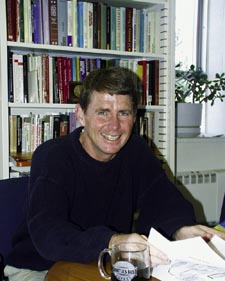|
This is an archived article.
For the latest news, go to the Advance
Homepage
For more archives, go to the Advance Archive/Search Page. |
||
|
Adult
Learning Specialist
Appointed to Endowed Chair Sheckly Named Neag Professor By Janice Palmer If you want adults to learn, forget the classroom. That recommendation comes from Barry Sheckley, a professor in the Department of Educational Leadership, who has devoted more than 20 years to understanding how adults learn best. He gives most policies and practices related to workforce retraining, including professional development for teachers, a C- grade.
Sheckley has been named the Neag Professor of Adult Learning - an appointment made official several weeks ago by the UConn Board of Trustees. This is the first professorship and the second faculty position endowed by the $21 million gift made to the school of education by alumnus Ray Neag. Richard Schwab, dean of the school, believes the designation is well deserved. "Barry Sheckley personifies everything we want to support in an endowed professorship," Schwab says. "He is an avid scholar, a great teacher, and works diligently in service to the school and the state." Adult learning is one of the key areas for growth identified in the Neag School's strategic plan, which was mapped out four years ago. Sheckley collaborates with a team that includes two colleagues from his department, Marijke Kehrhahan and Sandy Bell, and about 30 Ph.D. candidates. The Neag School is one of only a few schools of education in the country focusing on the field of adult learning. According to Schwab, "There is no better place than a school of education for helping business and industry understand how to effectively retrain its workers. We've dedicated our lives to understanding how people learn." The Neag School's commitment to adult learning, a relatively young field of study, comes at a time when labor experts predict that 75 percent of the nation's workforce will need retraining over the next five to seven years. For some, this may be learning the frustrating quirks of computer software. For most it will be learning the intricacies of a newly created job. Whatever the task is, learning will be a core issue. To be effective, says Sheckley, the process will not involve putting adults into a classroom for instruction. "Most research shows the classroom-based process used to develop proficiency among our adult workforce is not effective. It simply does not work. This is a huge policy issue," Sheckley says emphatically . "We try to teach adults 'answers' as if we know what future problems they will face. Instead, we should be focused on developing their proficiency, the ability to use information skillfully." This task, he explains, involves enhancing adults' problem-solving, analytical, and creative thinking skills: "We need people who can work independently. Those are the skills valued by employers, but they are a by-product not the central focus of our current workforce development system." Sheckley has crafted a method for making learning more effective for adults, and it is based upon a model known as PLAI (pronounced "play"), which stands for professional learning as inquiry. Adult learners, interested in addressing a problem that is genuine to them, are guided to frame the task in terms of a set of principles of best practice. These ideals are based on a combination of the learners' past experiences, as well as information in research literature. The learners are then guided to use the principles as a basis for testing ideas for solving their problems in achieving the task. Usually the process produces unexpected results that require participants to rethink their perspectives and assumptions, and through this analysis individuals come to understand the problem in greater depth. The key to making this process work, says Sheckley is changing the working environment to support unfettered inquiry. This change may include altering or refining long-standing practices and policies within a business or industry. Sheckley, who works with state agencies, local school districts, and private industry, defers when asked to conduct the traditional one-day workshops because, he says, "such sessions are not effective. Often they are not meaningful to the participant." Instead, he works with employers to set up a program minimizing classroom instruction and maximizing the educational potential of the "ecology" or environment within an individual's workgroup - the forum in which most learning actually occurs. As part of that ecology, Sheckley believes that adult learners need an early understanding of what is to be learned and how it is to be learned. Deliberate practice, giving learners an opportunity to test out ideas, challenging learners to think through why certain results occur, encouraging individuals to reflect on their practice, and receiving immediate feedback from peers, supervisors, and subject-matter experts are also critical elements. Sheckley, who began his academic career at UConn in 1981, has co-authored three books on adult learners. Recently, he received the first research award presented by the Association of Continuing Higher Education, a national organization. Sheckley says his UConn career has been very rewarding. He adds that the endowment established by donor Ray Neag, and the support of the Neag School, will provide significant opportunities to further his work on adult learning - an issue he describes as "one of the most pressing educational policy issues facing the United States today." |

